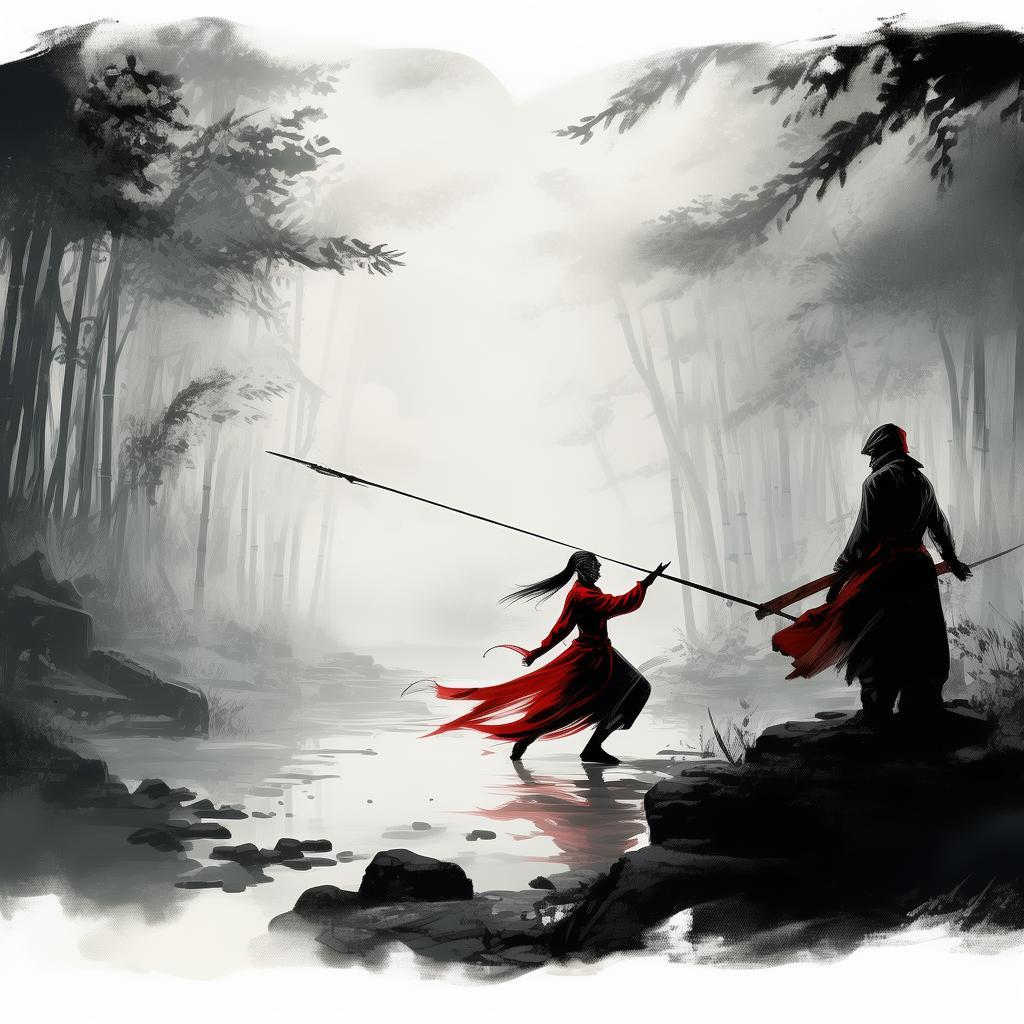The Oboe's Odyssey: A Martial Monk's Betrayal
In the remote mountains of ancient China, where the whispering winds carried the secrets of the ancients, there existed a martial monk named Chuan. Known for his agility and grace, Chuan was a master of the wind-style martial arts, his weapon of choice a unique oboe that resonated with the ancient energy of the cosmos. His life was a testament to the harmony of body and soul, until the day when the oboe, his lifelong companion, spoke of betrayal.
The story began in the serene abode of the Cloudy Monastery, where Chuan had lived in solitude for years, perfecting his art and meditation. One fateful evening, as he played the oboe, a melody that was not his own echoed through the temple. It was a haunting tune, one that spoke of loss, of a past that was meant to remain buried. Intrigued, Chuan followed the melody, which led him to a hidden chamber beneath the temple.
In the dim light of the chamber, an ancient scroll was rolled out, revealing a tale of his lineage, one intertwined with the fate of a legendary weapon—a sword that could only be wielded by a monk who had mastered the oboe. The scroll spoke of a prophecy, of a monk who would bring peace and harmony to the land, but at a great personal cost. The cost, it seemed, was his own soul.
The next morning, Chuan was summoned by the abbot, who spoke of a disturbance at the borders of the empire. An army of bandits, led by a ruthless warlord, threatened to overrun the peaceful villages. The abbot, seeing the resolve in Chuan's eyes, tasked him with a mission: to retrieve the legendary sword and bring peace to the realm.
Chuan's journey began with a quest to find the sword, which was said to be hidden in the treacherous Dragon's Nest, a mountain range known for its treacherous paths and treacherous inhabitants. Along the way, he encountered various factions, each with their own agenda and desire for the sword. Some sought power, while others believed the sword to be a catalyst for the prophecy's fulfillment.
As Chuan ventured deeper into the mountains, the melody of the oboe began to guide him, leading him to hidden paths and ancient ruins. He encountered mystical creatures, martial artists, and even the specter of his own past, a warrior monk who had abandoned his oboe and his quest for power.
The climax of the story came when Chuan finally reached the Dragon's Nest. There, he was confronted by the warlord, who held the sword and sought to use it to conquer the land. In a fierce battle, Chuan and the warlord clashed, their martial arts and weapons clashing with a force that shook the very mountains. The battle was fierce, and the outcome uncertain, as the warlord's forces pressed in from all sides.
In the midst of the chaos, the oboe's melody grew stronger, filling Chuan with a sense of purpose and resolve. He drew the sword from its hidden chamber, feeling the ancient energy course through his veins. The sword, it seemed, had been waiting for him all along.
The final confrontation between Chuan and the warlord was a dance of death and life, as each move was met with a counter-move of equal ferocity. In the end, it was the oboe's melody that turned the tide. The warlord, caught in the harmony of the ancient instrument, was overwhelmed by a sense of peace and defeat. Chuan, with a final, decisive strike, ended the warlord's reign of terror.

With peace restored, Chuan returned to the Cloudy Monastery, the oboe in his hands. He realized that the true power of the sword and the oboe lay not in their material form, but in the harmony of the soul. The melody of the oboe, which had guided him throughout his journey, was a reminder of the balance between the martial and the spiritual, between conflict and peace.
As Chuan meditated in the temple, the oboe's melody filled the air, a testament to the journey he had undertaken and the lessons he had learned. He understood that the sword and the oboe were not merely tools of power, but symbols of the path he must continue to walk—a path of balance, of harmony, and of the eternal struggle between the martial and the spiritual.
In the end, Chuan's journey was not just a quest for the sword, but a quest for himself, a journey to find the true meaning of his martial destiny. And as the melody of the oboe continued to resonate through the temple, it was a melody of hope, of the eternal quest for harmony in a world that was often at odds with itself.
✨ Original Statement ✨
All articles published on this website (including but not limited to text, images, videos, and other content) are original or authorized for reposting and are protected by relevant laws. Without the explicit written permission of this website, no individual or organization may copy, modify, repost, or use the content for commercial purposes.
If you need to quote or cooperate, please contact this site for authorization. We reserve the right to pursue legal responsibility for any unauthorized use.
Hereby declared.









